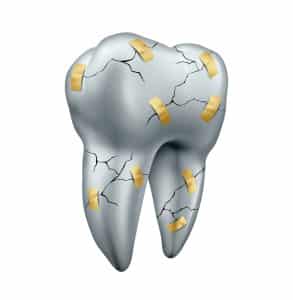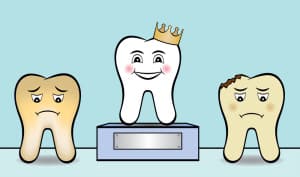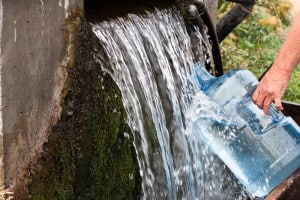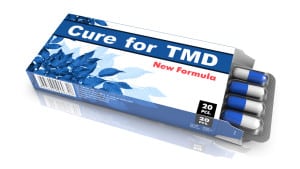 Did you know that some toothpaste consists of harmful chemicals? These chemicals can dry your oral tissues causing dry mouth, bad breath, and even canker sores. You wouldn’t expect that your toothpaste could actually make your mouth unhealthy while you are using it for the exact opposite reason. Some of these harmful ingredients found in toothpaste and mouthwash include ammonia, hydrogen peroxide, and formaldehyde. Many people are moving toward organic products including toothpaste. Should you? Take our quiz about organic toothpaste to find out more.
Did you know that some toothpaste consists of harmful chemicals? These chemicals can dry your oral tissues causing dry mouth, bad breath, and even canker sores. You wouldn’t expect that your toothpaste could actually make your mouth unhealthy while you are using it for the exact opposite reason. Some of these harmful ingredients found in toothpaste and mouthwash include ammonia, hydrogen peroxide, and formaldehyde. Many people are moving toward organic products including toothpaste. Should you? Take our quiz about organic toothpaste to find out more.
Facts About Contouring
 Do you see too much of your gums when you smile? Is there such a thing as seeing too much gum? If so, how much is too much? People have an innate attraction to beauty. We react favorably to an attractive smile or an attractive face. We may not know what makes them attractive, but we agree that they are. The amount of gum and teeth are two things that can make a smile attractive or not. If you have too much gum, you will be interested in facts about contouring.
Do you see too much of your gums when you smile? Is there such a thing as seeing too much gum? If so, how much is too much? People have an innate attraction to beauty. We react favorably to an attractive smile or an attractive face. We may not know what makes them attractive, but we agree that they are. The amount of gum and teeth are two things that can make a smile attractive or not. If you have too much gum, you will be interested in facts about contouring.
The Kind Of Dental Treatment People Wish For
 Dental bonding is one dental treatment that you do not have to fear. It is a minimally invasive cosmetic procedure that is quick, easy, affordable, and best of all: painless. There is no cutting or drilling with dental bonding. It is done with the same material that is used for white fillings–composite resin. It blends with surrounding dentition and can last for years. If dental bonding is the kind of dental treatment you’ve been wishing for, check it out.
Dental bonding is one dental treatment that you do not have to fear. It is a minimally invasive cosmetic procedure that is quick, easy, affordable, and best of all: painless. There is no cutting or drilling with dental bonding. It is done with the same material that is used for white fillings–composite resin. It blends with surrounding dentition and can last for years. If dental bonding is the kind of dental treatment you’ve been wishing for, check it out.
Can Intrinsic Tooth Stains Be Removed?
 Did you know that there are different kinds of tooth stains? There are intrinsic stains and extrinsic stains. Intrinsic means that the stains are inside the tooth. Extrinsic means the stains are on the exterior of the tooth. Your tooth is encapsulated with tooth enamel, so exterior stains are those that adhere to your tooth enamel. Extrinsic stains can be removed via bleaching, but can intrinsic tooth stains be removed?
Did you know that there are different kinds of tooth stains? There are intrinsic stains and extrinsic stains. Intrinsic means that the stains are inside the tooth. Extrinsic means the stains are on the exterior of the tooth. Your tooth is encapsulated with tooth enamel, so exterior stains are those that adhere to your tooth enamel. Extrinsic stains can be removed via bleaching, but can intrinsic tooth stains be removed?
The Fluoride Question
 Although it has been proven that fluoride is an effective way to fight cavities, there has always been a question as to its safety. Research and experience goes back 60 years when it comes to fluoride safety, yet there are still naysayers. It is good to question. It is good to be sure. In the1930s it was noticed that those communities whose water supply contained certain levels of natural fluoride had a lower rate of tooth decay. All water naturally contains fluoride but not at a level that will combat decay. In 1945 Grand Rapids Michigan became the first U.S. city to add fluoride to its local water supply. Is fluoride safe for your children? Today we discuss the fluoride question.
Although it has been proven that fluoride is an effective way to fight cavities, there has always been a question as to its safety. Research and experience goes back 60 years when it comes to fluoride safety, yet there are still naysayers. It is good to question. It is good to be sure. In the1930s it was noticed that those communities whose water supply contained certain levels of natural fluoride had a lower rate of tooth decay. All water naturally contains fluoride but not at a level that will combat decay. In 1945 Grand Rapids Michigan became the first U.S. city to add fluoride to its local water supply. Is fluoride safe for your children? Today we discuss the fluoride question.
Teeth Built Tough With Dental Sealants
 Are your children’s teeth built tough? Teeth are tough, but they aren’t indestructible. They can develop cavities, get broken, cracked, fractured, and even knocked out. If you could prevent any one of those things from happening with a clear liquid and a paint brush, would you? Your children’s teeth can be built tough with dental sealants. If you aren’t familiar with sealants, or even if you are, take our true and false quiz below to find out how much you know.
Are your children’s teeth built tough? Teeth are tough, but they aren’t indestructible. They can develop cavities, get broken, cracked, fractured, and even knocked out. If you could prevent any one of those things from happening with a clear liquid and a paint brush, would you? Your children’s teeth can be built tough with dental sealants. If you aren’t familiar with sealants, or even if you are, take our true and false quiz below to find out how much you know.
Does Your Child Fear The Dentist?
 According to research, parents who fear the dentist will pass that fear on to their children. They may not even do it consciously. Children are very in tuned to their parent’s feelings and emotions and can pick up on little cues. But it is important that children learn to feel comfortable with dental visits especially since two of the major reasons people skip their dental care is due to dental fear and anxiety. Does your child fear the dentist?
According to research, parents who fear the dentist will pass that fear on to their children. They may not even do it consciously. Children are very in tuned to their parent’s feelings and emotions and can pick up on little cues. But it is important that children learn to feel comfortable with dental visits especially since two of the major reasons people skip their dental care is due to dental fear and anxiety. Does your child fear the dentist?
Some Facts About Bruxism
 Bruxism is a Greek word that means the habit of grinding your teeth unconsciously. People often brux at night while they are sleeping, but you may also brux while you are awake. You still may not be aware of it because it often happens while you are concentrating, stressed, upset, or angry. Although you may not be aware you are bruxing, you may be getting symptoms from it just the same. Today we share some facts about bruxism.
Bruxism is a Greek word that means the habit of grinding your teeth unconsciously. People often brux at night while they are sleeping, but you may also brux while you are awake. You still may not be aware of it because it often happens while you are concentrating, stressed, upset, or angry. Although you may not be aware you are bruxing, you may be getting symptoms from it just the same. Today we share some facts about bruxism.
Stop Snoring! Please!
 Snoring is common. Over 60 percent of the adult population snores. However, snoring can put stress on a relationship. In fact, in some cases couples are forced to sleep apart due to the excessive snoring of their partner. Excessive, loud snoring can be an indication of obstructive sleep apnea, a potentially serious condition. But not all people who snore have sleep apnea. Even so, snoring can be treated. If your partner has a snoring problem don’t stop at saying “Stop Snoring! Please!” contact Dr. Smith to learn about treatment options.
Snoring is common. Over 60 percent of the adult population snores. However, snoring can put stress on a relationship. In fact, in some cases couples are forced to sleep apart due to the excessive snoring of their partner. Excessive, loud snoring can be an indication of obstructive sleep apnea, a potentially serious condition. But not all people who snore have sleep apnea. Even so, snoring can be treated. If your partner has a snoring problem don’t stop at saying “Stop Snoring! Please!” contact Dr. Smith to learn about treatment options.
Are Your TMJs Stressed Out?
 Temporomandibular joint is a very big word for your jaw joint. Your jaw joint connects your lower jaw (your mandible) to your skull via your temporal bones, hence, the term temporomandibular joint. Your jaw joints are in front of your ears and allow your jaw to move. Your temporomandibular joints (TMJs) are probably the most active joint in your body. They take a lot of wear and tear. You use your TMJs to talk, chew, yawn, and sing. If you are a bruxer–meaning you chronically grind and clench your teeth–you are putting even more stress on your TMJs. Are your TMJs stressed out?
Temporomandibular joint is a very big word for your jaw joint. Your jaw joint connects your lower jaw (your mandible) to your skull via your temporal bones, hence, the term temporomandibular joint. Your jaw joints are in front of your ears and allow your jaw to move. Your temporomandibular joints (TMJs) are probably the most active joint in your body. They take a lot of wear and tear. You use your TMJs to talk, chew, yawn, and sing. If you are a bruxer–meaning you chronically grind and clench your teeth–you are putting even more stress on your TMJs. Are your TMJs stressed out?







